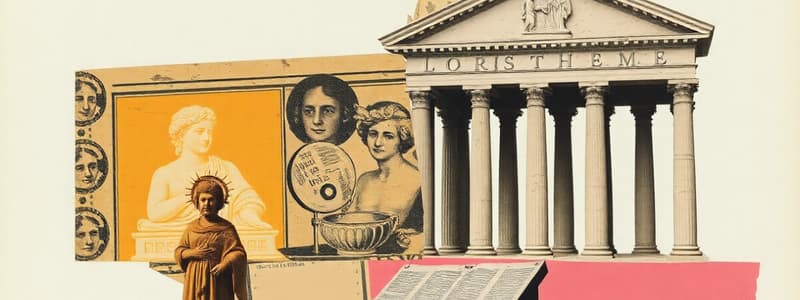Podcast
Questions and Answers
How did Aristotle's early life experiences contribute to his later intellectual pursuits?
How did Aristotle's early life experiences contribute to his later intellectual pursuits?
Growing up in a family with medical and scholarly traditions exposed Aristotle to natural science and inquiry, which significantly influenced his focus on empirical observation and systematic study of the natural world.
Describe one key difference between Plato's Academy and Aristotle's Lyceum, and explain how this difference reflected Aristotle's philosophical approach.
Describe one key difference between Plato's Academy and Aristotle's Lyceum, and explain how this difference reflected Aristotle's philosophical approach.
Plato's Academy was more focused on abstract philosophical concepts, while Aristotle's Lyceum emphasized empirical observation and research across a broad range of subjects. This reflected Aristotle's commitment to grounding knowledge in real-world evidence.
In what ways did Aristotle's scientific work depart from purely theoretical approaches common in pre-Socratic philosophy?
In what ways did Aristotle's scientific work depart from purely theoretical approaches common in pre-Socratic philosophy?
Aristotle's scientific work embraced observation, classification, and documentation of living organisms, setting him apart from the primarily theoretical approaches of pre-Socratic philosophers, who often relied on abstract reasoning rather than empirical evidence.
Explain how Aristotle's idea of ‘virtue as a mean’ applies to ethical decision-making, providing a hypothetical example.
Explain how Aristotle's idea of ‘virtue as a mean’ applies to ethical decision-making, providing a hypothetical example.
How does Aristotle's concept of hylomorphism explain the relationship between matter and form, and why is this significant?
How does Aristotle's concept of hylomorphism explain the relationship between matter and form, and why is this significant?
Describe the purpose of Aristotle's Organon and its lasting impact on logical reasoning.
Describe the purpose of Aristotle's Organon and its lasting impact on logical reasoning.
What kind of political system did Aristotle advocate for in his Politics, and what were its primary goals?
What kind of political system did Aristotle advocate for in his Politics, and what were its primary goals?
In what ways did Aristotle's approach to ethics, as outlined in Nicomachean Ethics, differ from a strict adherence to rules or duties?
In what ways did Aristotle's approach to ethics, as outlined in Nicomachean Ethics, differ from a strict adherence to rules or duties?
How did Aristotle's concept of hylomorphism explain change, persistence, and the nature of objects?
How did Aristotle's concept of hylomorphism explain change, persistence, and the nature of objects?
Explain Aristotle's concept of the 'golden mean' within his virtue ethics, and provide an example.
Explain Aristotle's concept of the 'golden mean' within his virtue ethics, and provide an example.
In Aristotle's political philosophy, what is the role of the polis, and why did he consider humans to be inherently political beings?
In Aristotle's political philosophy, what is the role of the polis, and why did he consider humans to be inherently political beings?
Describe Aristotle's method of systematic inquiry and how it blended deductive reasoning with empirical investigation.
Describe Aristotle's method of systematic inquiry and how it blended deductive reasoning with empirical investigation.
Outline how Aristotle’s work laid the groundwork for modern science through his approach to biological classification.
Outline how Aristotle’s work laid the groundwork for modern science through his approach to biological classification.
How did Thomas Aquinas use Aristotelian philosophy?
How did Thomas Aquinas use Aristotelian philosophy?
What is eudaimonia in Aristotelian ethics, and how is it achieved?
What is eudaimonia in Aristotelian ethics, and how is it achieved?
Explain how the rediscovery of Aristotle's works during the Renaissance influenced the development of modern science.
Explain how the rediscovery of Aristotle's works during the Renaissance influenced the development of modern science.
How does Aristotle's approach to knowledge differ from Plato's theory of innate ideas?
How does Aristotle's approach to knowledge differ from Plato's theory of innate ideas?
Describe Aristotle's concept of 'substance' and 'essence.'
Describe Aristotle's concept of 'substance' and 'essence.'
What makes Aristotle's Poetics significant?
What makes Aristotle's Poetics significant?
How does Aristotle describe the ideal state in his Politics?
How does Aristotle describe the ideal state in his Politics?
What is the significance of the syllogism in Aristotle’s formal logic?
What is the significance of the syllogism in Aristotle’s formal logic?
How did Aristotle's empirical approach influence the development of scientific methods?
How did Aristotle's empirical approach influence the development of scientific methods?
In what ways does Aristotle’s ethical theory remain relevant in modern moral philosophy?
In what ways does Aristotle’s ethical theory remain relevant in modern moral philosophy?
Flashcards
Who was Aristotle?
Who was Aristotle?
Greek Philosopher and polymath, student of Plato. Explored logic, science, ethics, politics, metaphysics and art.
Aristotle's Origins
Aristotle's Origins
Aristotle was born in Stagira, Greece in 384 BCE. He came from a family with medical and scholarly traditions.
Plato's Academy
Plato's Academy
Aristotle studied at Plato's Academy for two decades. He eventually diverged from Plato's views.
The Lyceum
The Lyceum
Aristotle founded the Lyceum in Athens in 335 BCE, where he developed his encyclopedic system of thought.
Signup and view all the flashcards
Scope of Aristotle's work
Scope of Aristotle's work
Aristotle's writings cover logic, ethics, politics, metaphysics and natural science.
Signup and view all the flashcards
Organon
Organon
A collection of Aristotle's texts that established deductive reasoning and the syllogism.
Signup and view all the flashcards
Nicomachean Ethics
Nicomachean Ethics
Aristotle's work exploring virtue ethics, happiness (eudaimonia) and the idea of virtue as a mean.
Signup and view all the flashcards
Politics (Aristotle)
Politics (Aristotle)
Aristotle's analysis of different forms of government, advocating for a mixed regime focused on the common good.
Signup and view all the flashcards
Poetics
Poetics
Aristotle's critical study of tragedy and epic poetry, which has greatly influenced literary theory.
Signup and view all the flashcards
Aristotle's Empiricism
Aristotle's Empiricism
Knowledge originates from sensory experiences, organized and analyzed via logic.
Signup and view all the flashcards
Syllogism
Syllogism
A form of deductive reasoning comprised of two premises and a conclusion.
Signup and view all the flashcards
Hylomorphism
Hylomorphism
Everything is a combination of matter (substrate) and form (essence).
Signup and view all the flashcards
Virtue Ethics
Virtue Ethics
Character traits that fall between two extremes, representing a balance.
Signup and view all the flashcards
Eudaimonia
Eudaimonia
Flourishing/well-being; achieved through virtuous actions aligned with reason.
Signup and view all the flashcards
Role of the Polis
Role of the Polis
Humans are political by nature; the state's goal is to foster its citizens' virtue.
Signup and view all the flashcards
Systematic Classification
Systematic Classification
Ordered knowledge in a coherent framework.
Signup and view all the flashcards
Interplay of Theory and Observation
Interplay of Theory and Observation
Abstract principles must be tested against the observable world.
Signup and view all the flashcards
The Golden Mean
The Golden Mean
The concept of 'the golden mean'.
Signup and view all the flashcards
Virtue Ethics
Virtue Ethics
An approach to ethics which emphasizes character and virtue.
Signup and view all the flashcards
Politics
Politics
A detailed account of politics.
Signup and view all the flashcards
Lyceum
Lyceum
Aristotle's school of philosophy.
Signup and view all the flashcards
Practical Governance
Practical Governance
Examining various types of governments.
Signup and view all the flashcards
Political beings
Political beings
Humans are political beings.
Signup and view all the flashcardsStudy Notes
- Aristotle is one of the most influential figures in Western thought.
- His work covers logic, science, ethics, politics, metaphysics, and art.
- He used a systematic approach and emphasized empirical observation.
- His work contrasts and complements Plato's idealism.
Historical Context and Biography
- Aristotle was born in Stagira in 384 BCE.
- He grew up in a family with medical and scholarly traditions, influencing his later work.
- At seventeen, he studied at Plato’s Academy in Athens for nearly twenty years.
- He was influenced by Plato but developed his own views, particularly on forms and empirical evidence.
- After leaving the Academy, Aristotle traveled and broadened his intellectual horizons.
- In 335 BCE, he founded the Lyceum in Athens.
- At the Lyceum, he developed an encyclopedic system of thought, conducting research and teaching.
- His works were preserved, translated, and integrated into medieval universities.
- These works influenced both Islamic and Christian scholastic traditions.
Literary Contributions and Methodological Innovations
- Aristotle wrote in a treatise format, unlike Plato’s dialogues.
- His works cover a vast array of topics.
- Organon laid the foundation for deductive reasoning and the syllogism, in the area of Logic.
- Nicomachean Ethics explores virtue ethics, happiness (eudaimonia), and virtue as a mean between extremes, in the area of Ethics.
- Politics analyzes different forms of government and argues for a balanced regime aimed at the common good, regarding Politics.
- Metaphysics delves into questions of being, substance, and hylomorphism (matter and form), relating to Metaphysics.
- His extensive work in biology involved classification, observation, and documentation of living organisms.
- Poetics offers an early examination of tragedy and epic poetry, influencing literary theory for centuries.
- Aristotle's method involved careful observation and categorization.
- He believed knowledge begins with sensory experience organized and analyzed through logic.
- This approach contrasted with Plato's idealism and set the stage for scientific methods.
Core Philosophical Ideas
Logic and Epistemology
- Aristotle is considered the father of formal logic.
- His syllogism was the standard framework for logical analysis until modern times.
- He argued that knowledge is grounded in experience.
- He maintained that we derive general principles by observing particulars in the natural world, rather than innate ideas.
Metaphysics: Matter, Form, and Substance
- Hylomorphism is central to Aristotle’s metaphysics.
- Hylomorphism is the idea that everything is composed of matter (substrate) and form (essence or blueprint).
- This framework explains change, persistence, and the nature of objects.
- He focused on the underlying substance that makes objects what they are.
Ethics and the Pursuit of Happiness
- Nicomachean Ethics argues that the good life is achieved through virtues between extremes (the “golden mean”).
- Eudaimonia, or flourishing/well-being, is central to his ethical theory.
- Living well involves rational activity in accordance with virtue.
Political Philosophy and Social Organization
- Politics examines various forms of government.
- Aristotle advocated for a mixed system incorporating democracy and oligarchy.
- He saw humans as inherently political beings.
- He thought a good state cultivates virtue among its citizens.
- His analysis observed the strengths and weaknesses of existing regimes.
- Suggested reforms to achieve stability and justice.
Contributions to Science and Natural Philosophy
- His observations of flora and fauna led to one of the earliest systems of biological classification.
- His empirical work set the stage for later scientific inquiry in biology.
- He systematically categorized natural phenomena.
Methodology and Philosophical Approach
- Aristotle’s work is characterized by rigorous systematization.
- He sought to order knowledge in a coherent framework in logic, ethics, and natural science.
- His approach was a blend of deductive reasoning and empirical investigation.
- Abstract principles must be tested against the observable world.
- He exemplified a unified system of knowledge, where disciplines inform one another.
Legacy and Influence
- Aristotle’s influence permeates Western philosophy, science, and literature.
- His ideas formed the basis for medieval scholasticism.
- He influenced figures like Thomas Aquinas, who reconciled Aristotelian philosophy with Christian theology.
- The rediscovery of Aristotle’s works during the Renaissance sparked a revival in empirical investigation and rational inquiry.
- His ethical theories continue to inform debates in moral philosophy today.
- His logical methods are taught as the groundwork of critical thinking.
- His contributions to natural science and political theory are subjects of study and debate in academic circles.
Studying That Suits You
Use AI to generate personalized quizzes and flashcards to suit your learning preferences.




